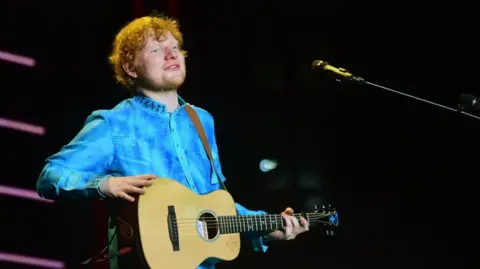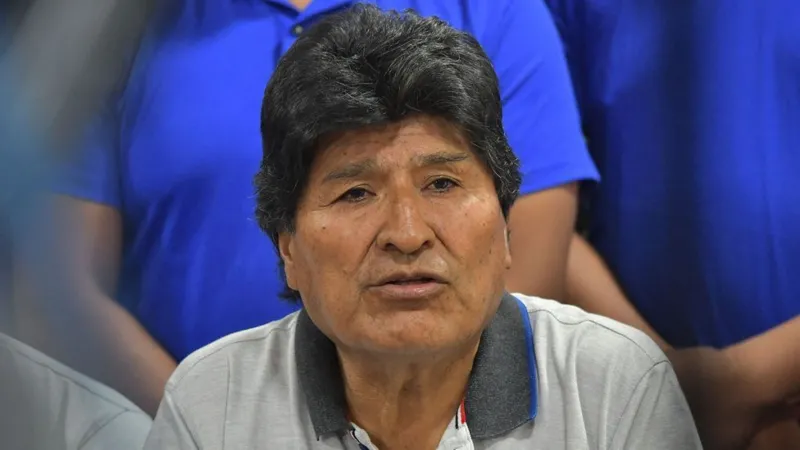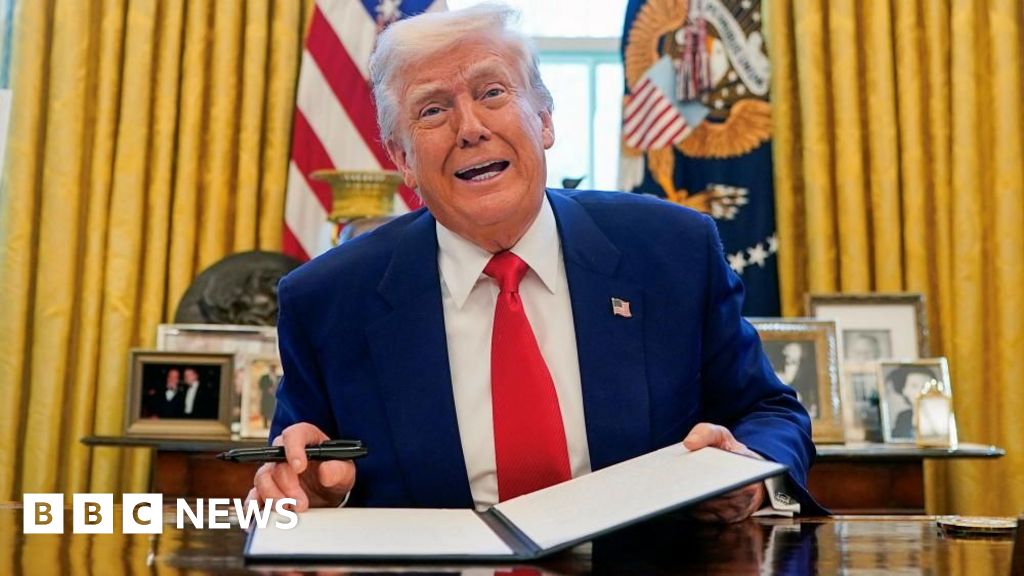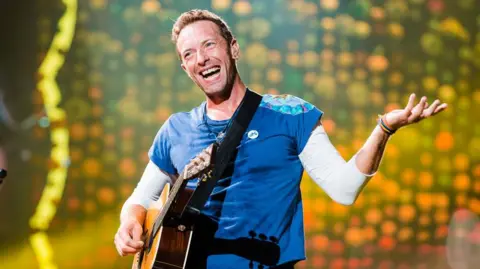 Getty Images
Getty ImagesIf you were in India and had 900,000 rupees ($10,800; £8,000), what would you buy? A car? A trip around the world? Diamond jewellery? Or a Coldplay concert ticket?
The British rock band is set to perform three shows of their Music of the Spheres world tour in Mumbai next year and the tickets are being sold for obscene amounts on reselling platforms, after being sold out in minutes on BookMyShow (BMS) – the concert’s official ticketing platform.
The tickets went on sale last Sunday and were priced from 2,500 rupees to 12,000 rupees. More than 10 million people competed to buy some 180,000 tickets.
Fans complained about hours-long digital queues and site crashes, but many also alleged that the sales were rigged as resellers had begun selling tickets for five times the price – touching even 900,000 rupees – before they were released on the official site.
Earlier this month, something similar happened with tickets for Oasis’ concert in the UK, where resellers charged more than £350 for tickets that cost £135. But even then, the inflated prices of Coldplay tickets stand out. To put this in perspective, Madonna charged £1,306.75 for VIP passes to her Celebration tour and the best tickets for Beyoncé’s Renaissance concerts sold for £2,400.
The events have sparked a conversation around ticket scalping in India, where people use bots or automation tools to bypass queues and purchase multiple tickets to sell on reselling platforms. Fans are questioning whether the official site had taken adequate steps to prevent this, or whether it chose to look the other way.
BMS has denied any association with resellers and urged fans to avoid tickets from “unauthorised sources” as they could be fake, but this hasn’t stopped people from viewing the site suspiciously.
Fans have complained about having a similar experience while buying tickets for Punjabi singer Diljit Dosanjh’s upcoming concerts. Tickets were released on Zomato Live, the concert promoter, earlier this month and after getting sold out, they began popping up on reselling platforms for several times the original price.
Ticket scalping is illegal in India, and experts say that while it’s possible that it’s happening anyway, it’s also likely that legitimate ticket-holders are selling theirs through resellers to make a profit due to the massive demand.
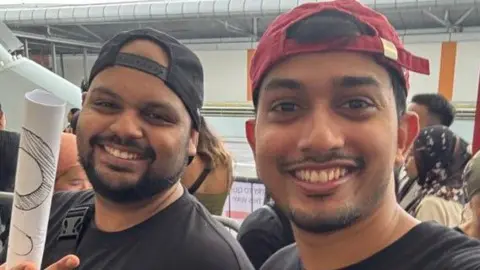 Dwayne Dias
Dwayne DiasGraphic designer Dwayne Dias was among the few lucky ones who managed to buy tickets for the Coldplay concert from the official site. He bought four tickets for 6,450 rupees each.
Since then, he’s been approached by people who are willing to pay up to 60,000 rupees for a ticket. “If I wanted to, I could sell all the tickets and watch the concert in South Korea [Coldplay’s upcoming touring destination]. The amount will cover my travel expenses and I’ll be able to experience a new city,” he says.
While the inflated prices of Coldplay tickets are shocking, the huge demand for tickets to see popular international artists perform is not uncommon. In fact, the live music business in India has been growing in leaps and bounds over the past couple of years.
According to a report, music concerts generated about 8,000m rupees in revenue last year and by 2025, this figure is set to increase by 25%. Brian Tellis, a veteran in the music business and one of the founders of the Mahindra Blues music festival, says concerts have become a part of an individual’s – and the country’s – cultural currency.
Chart-toppers like Ed Sheeran, Alan Walker and Dua Lipa have performed in India in the recent past, and the latter two are set to perform again this year. “Like for other industries, India is a booming market for the music business as well. There’s a huge demographic that’s young and has money to spend. Everyone wants a piece of the pie,” he says.
The soaring demand is evident in ticket prices and sales. Tellis says about a decade ago, 80% of production costs were footed by sponsors and 20% through ticket sales, but the numbers have reversed today.
“Attending a concert is a mix of bragging rights, being a conformist and being part of the scene,” he says. “There are true music lovers as well in the mix, but many attend because they get swept up by the hype surrounding a performance and they don’t want to feel left out.”
Days before and after Coldplay concert tickets went on sale, social media was full of captivating Instagram reels of the band performing hits like Adventure of a Lifetime and Fix You in packed stadiums, with fans singing along and turning the venue into A Sky Full of Stars with their LED bracelets. Influencers waxed eloquent about their love for the band and there was no dearth of Coldplay memes.
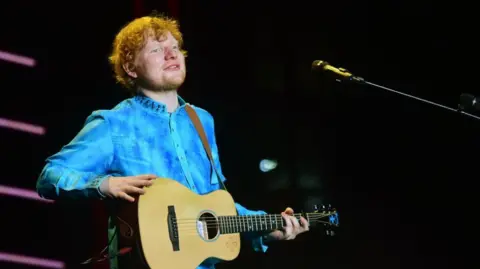 AFP
AFPIndustry sources told the BBC that targeted marketing plays a key role in ticket sales – a task handled by the promoter’s website. The more demand is created, the more ticket prices can be raised. Organising concerts is tough, as they often incur losses, so when the opportunity arises, bankable performers are exploited for profits.
While some fans argue that the government should take steps to control ticket prices, Tellis doesn’t agree. “This [selling tickets] is entrepreneurship – it won’t be right for the government to get involved. Because if you want to control revenue, then you’ll have to also control costs,” he says.
Despite the upward trajectory of India’s live music business, experts say the country still has a long way to go before it can be on a par with the international music scene.
“We have very few concert venues and they are not up to international standards,” Tellis says. “That’s why artists perform fewer shows in India despite the massive demand.”
Dias and his friends recently travelled to Singapore to attend a Coldplay concert. He says the ticket-booking experience was smooth, the venue was top-class and the crowd was well-managed.
He’s not sure he’ll have the same experience at DY Patil stadium – the venue for the band’s concerts in India. “For one, it’s much smaller and crowds in India can be quite indisciplined,” he says. He’s also worried about how safe the venue will be and whether the crowd will be managed properly at entry and exit points.
But for now, he’s holding on to his tickets and is prepared to endure whatever lies ahead, just to get a chance to watch Chris Martin and company perform again.
